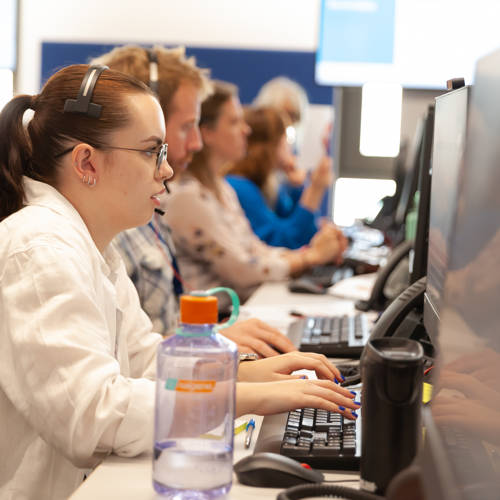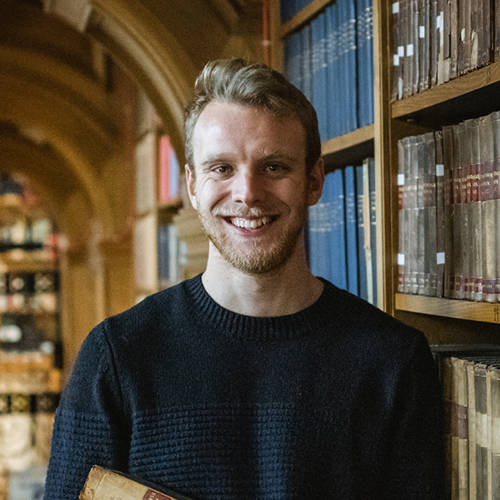Overview
Explore the past to shape your future with our BA (Hons) History at Canterbury Christ Church University. If you're looking for a course that spans centuries of history, this degree offers you the chance to delve into the people, ideas, conflicts, and movements that have shaped the world.
What you’ll learn
- Become an historian as you immerse yourself in deep layers of history that spans Europe and afar.
- Uncover hidden histories from diverse cultures, voices, and time periods.
- Apply history across a range of industries, careers, institutions, and settings.
- Explore history beyond the classroom: in archives, theatres, virtual worlds, museums, and at historic sites.
- Study in a UNESCO world heritage site and explore some of the country’s most treasured monuments including Augustine’s Abbey and the country’s oldest continually consecrated church, St Martin’s.
Studying History at CCCU will show you how the world has been shaped by history. You’ll make connections between the past and present as you perfect your craft as an historian through critical interrogation and application in practice.
Upon graduation, you’ll have a portfolio of your best work to showcase to employers, setting you up for success in creative and heritage industries, education, business, politics, and more. At Canterbury you don’t just study history - you live it, and you make it.
Why study History at CCCU?
- Select your qualification
- Select your grade
- Add it and repeat
Accepted qualifications
We accept a wide range of general qualifications that attract UCAS Tariff points either on their own or in combination with others. Below are some common examples.
| Qualification | Grades |
|---|---|
| A Levels | BBC |
| BTEC | DMM |
| Access | 15 Distinctions and 30 Merits |
| International Baccalaureate | 29 Points |
The grades in this table provide an indication of what is required to study this course. If you have qualifications that are not present in the table or want to tell us more about you specific situation then please contact our friendly Course Enquiry Team.
Don’t meet these entry requirements?
If you do not meet these entry requirements, a foundation year is a great way of beginning your university journey. We recommend you speak to our Course Enquiries team who will advise on a route to study that fits you.
More information
Contact us
Module information
Core/optional modules
How you’ll learn
You will be taught through a combination of lectures, seminars, workshops, and ‘hands on’ sessions out in the world, rather than on campus, as well as on some field trips. You will typically have around 12 contact hours per week although your contact hours in Years 2 and 3 will depend on the optional modules that you select.
You will be supported in your learning through regular access to your tutors, who have office hours devoted to students each week, and through one-to-one tutorials during a designated tutorial week in each semester. You can meet periodically with your personal academic tutor and the Course Team run regular ‘surgeries’ where any issues can be raised and addressed. All modules are supported by a virtual learning environment (VLE), providing information, lecture recordings, resources, and a variety of materials geared towards your development. You'll also have access to IT and library facilities throughout your course.
In Year 2, you will have an exciting ‘challenge’ opportunity to complete an employability placement or ‘industry brief’ using your historical training, which will develop a range of crucial graduate skills. In year 3, the ‘pathways’ which history graduates take into an array of vibrant workplaces are explored in detail in ‘Being a Historian’. You will graduate ‘job-ready’ with a curated ‘portfolio’ of your best work from your degree, paired with a summarising letter of reference for you written by the Course Team.
When not attending lectures, seminars, workshops or other timetabled sessions you will continue learning through self-study. Typically, this involves reading journal articles and books, undertaking research in the library, and preparing for coursework assignments, workshops and seminars. Your module tutor will direct you towards specific readings or activities to complete before classes, or between them.
For the Major Project in Year 3, you will undertake independent research, working under the supervision of a member of the History team who you will meet with regularly. This project can take the traditional form of a dissertation, or, it can be a creative outlet for newer and inspiring forms of history such as a podcast, a customised key stage curriculum, or a historical context policy briefing for a parliamentary committee.
You will have around 10-12 hours of formal ‘in-class’ contact time in each teaching week. Generally speaking, each module requires 2 points of formal assessment, and the overall volume of work you will produce increases a little bit each year, building you up as a writer and independent researcher. A handy rule is to spend one hour preparing for every hour you will be in a classroom setting. Some weeks might require more of your time as you prepare assessments for submission, others might make gentler demands on your time.
You will be taught by staff who are all professional historians, passionate teachers, and experts in their respective fields. We are active and published researchers of national and international standing, and in class you will experience ‘research-led’ teaching, sometimes even exploring new research topics or projects with your lecturers before anyone else!
All our team members hold doctoral qualifications and are experienced teachers. You can find out more about the current teaching on our History subject area web page.
Postgraduate students sometimes assist in teaching and in assessing some modules, working alongside experienced members of staff. The permanent course team teach the vast majority of lectures and seminars across all three years of the degree.
Innovative teaching, the excitement of ‘laying hands’ to history, and practice applying its unique insights, all sit at the heart of the BA History degree at CCCU. Your time here will combine the tested and true ways that people have learned about history for centuries with important new developments. These include digital techniques, creative, public, and non-traditional historical formats, plus compelling avenues for independent research, choice, and exploration.Dr Dave HitchcockReader in early modern British history
How you’ll be assessed
Our History modules are assessed by a variety of methods, with coursework being by far the most common. We provide you with significant choice when it comes to topics and questions to pursue, and many assessments invite you to engage creatively and deploy talents you might have such as digital skills, public speaking, visual art production, creative storytelling, and more.
The written word does feature prominently, as you would expect. Your coursework typically involves essays, document analyses, presentations, portfolio assignments, digital projects, podcasts, field reports, and more.
We never set exams. Usually, each module has two pieces of assessment of different kinds. You must achieve a pass mark of 40 or above in all Year 1 modules order to progress to Year 2.
Your future career
History graduates are everywhere. We work in the tech sector, in public policy, in local government, in heritage, in law, journalism, education, media, and so much more. History is flexible and rigorous academic training for wide variety of possible careers.
This degree is designed to prepare you not just for further academic study, but particularly for the world of work by emphasising the transferable skills valued by employers across a spectrum of professions, including independent empirical research, critical thinking, creative reinterpretation, mapping lateral connections, sorting and prioritising complex information, and clear writing.
Recent history graduates have embarked on careers in heritage, education, the public sector, the arts industries and in a wide variety of business settings.
After leaving Christ Church and its historians I did a stint in the private sector before finding my real calling as a campaigner within the UK voluntary sector, becoming Head of Campaigns for the RNID (now re-named Action on Hearing Loss). In parallel I became involved with political think-tanks such as the Fabian Society writing on foreign policy issues. In both cases my History degree was useful both in terms of content (how political issues are understood and acted upon) and training (how to construct a sound argument). I am now Head of Communications at International Alert, an NGO for which I continue to use those same skills working in armed conflicts around the world.Chris UnderwoodHead of Communications, International Alert
Related courses
Fees
Tuition Fees for 2026/27 have not yet been finalised. These course web pages will be updated with Tuition Fee information once they have been agreed.
- Read advice about funding your degree
- See information about the financial support available for undergraduate studies
- If you would like information about paying your fees, please contact accounts.receivable@canterbury.ac.uk
- For specific fee queries, please contact fees@canterbury.ac.uk
Industry links
This Course is designed with explicit links to the heritage, creative, archive, educational, and public policy sectors of both Kent and the UK, both in the taught curriculum and beyond it. CCCU History students work or volunteer in museums, they collaborate on or contribute to research projects, they make positive differences in the community.
As part of this degree, you can work closely with industry partners in county archives, in schools, in local government, or in the creative industries to bring history alive, to discover something new about the past, or to enrich public understandings of heritage.
Notable partnerships include: the Kent History Centre archive in Maidstone, the Canterbury Cathedral archive, English Heritage, the Canterbury Historical Association, local businesses such as the Franciscan Gardens, the Canterbury BID coalition, the Canterbury City Council, a range of schools in Canterbury, and more.
Regulated by the Office for Students
The Office for Students (OfS) regulates Canterbury Christ Church University. The OfS is the independent regulator of higher education in England. It aims to ensure that every student, whatever their background, has a fulfilling experience of higher education that enriches their lives and careers. Further details about its work are available on the OfS website.
Apply now
Duration:
3 yearsUCAS code:
V100Location(s):
CanterburyFind out more
Sign up to hear the latest from the University, including upcoming events, useful updates, student life and more!




